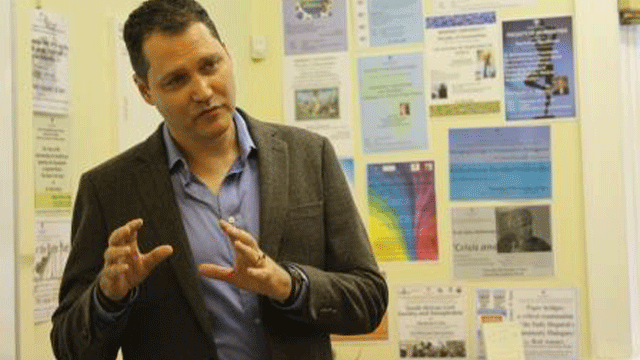
Words by Sam van Heerden
Dr Richard Pithouse, academic, activist and member of the Unit for Humanities at Rhodes University (UHURU), launched his book ‘Writing the Decline’ at Rhodes University on Thursday evening, 15 April. The book chronicles the supposed decline of South Africa in the Zuma era.
“[The book] is a collection of interventions into the public sphere,” said Pithouse. The book is in the form of a collection of newspaper articles written over the past 8 years, based mainly on experiences in both Durban and Grahamstown. The articles cover both the decline and criticism of Zuma’s era in office, but also cover the stories and experiences of marginalised groups.
At the launch, Pithouse explained that he has been writing for the public sphere for twenty years and that he did not plan on becoming an academic. He briefly described his journey into the world of writing in Durban, and explained how he grew critical of the mainstream Durban Press because of what they thought was, or more importantly was not, newsworthy.
Pithouse wrote about what the mainstream media ignored - the oppressed and marginalized, especially the poor, and their experiences of police brutality. “Colonialism on the theoretical level is an ontological split between those considered human and those not considered human,” he explained, “I’ve really tried my best to tell the truth about peoples’ lives and experiences.”
Initially when approached to write the book, Pithouse turned the offer down because his stuff is already on websites. But he said yes the second time because he realised that digital archives aren’t stable. “I wanted to take those stories of people who had been killed by the police and assassinated and to have them out there because no-one else had done that work,” he said.
But his publisher said that he could not only write about those stories. He described how, when being critical of Zuma, he had a big readership which was mostly black. However, he said that there is not a big readership for the struggles of the black and poor.
In order to write about their strife, he had to write about something else – like the decline of the state – to appeal to the middle class. He therefore sees the book as a compromise between a record of oppression, and the articles that had bigger readerships, both of which he was glad to have written about.
Although he considers himself on the political “left”, he is critical of the left too. For example, he spoke of the courage of women in emancipatory movements in asking difficult questions, and spoke out against sexism. He also described how “the left” used to constitute anyone who was critical of neoliberalism, but that many of these people have the same set of assumptions and prejudices as the political ‘right’.
Pithouse has also experienced criticism. He described his experience of detainment following his criticism of Zuma by a “political gangster” called Rickie Governor. He was also blocked by “left” academics who told universities not to publish his writing, and he has been the subject of slander.
But he learned a lesson from this: “Anyone who tells you that you shouldn’t have debate in your struggle, that you shouldn’t have critique, that you shouldn’t be able to raise questions about problematic behaviour, is really, really wrong. Things can go fundamentally wrong in any progressive space.”
On this point he warned against the declining credibility in the public sphere. “If the public sphere collapses, then it becomes incredibly difficult to have a meaningful conversation about what is going on,” he said.
The sub-title “On the struggle for South Africa’s Democracy” was not Pithouses’ choice. But he says he does take democracy ‘very seriously’. He talked about the need for a substantive democracy, where it is run by the power of the people. “It’s only when all of civil society is called to the public sphere that results can come about,” he said. His book was praised at the launch for reaching the middle ground between writing about the decline, writing against the decline, but having the political courage not to surrender to the decline.
Writing the Decline has received favourable reviews, and Pithouse is currently writing two more books - one on Durban and another one on Fanon – which are due for release next year.
Caption: Richard Pithouse at the launch of his book ‘Writing the decline’
